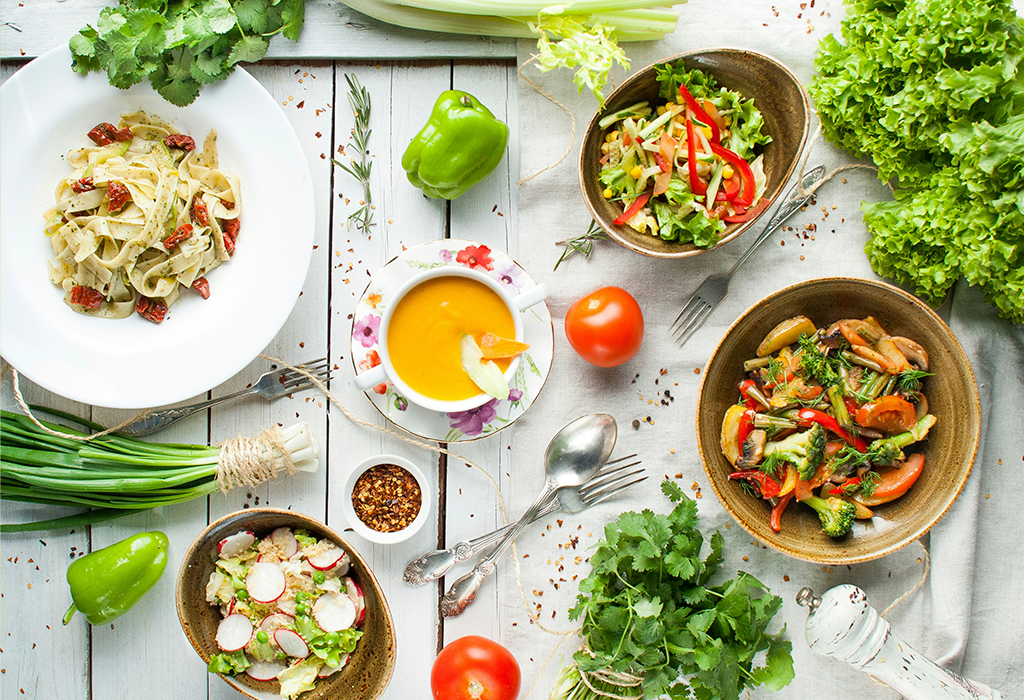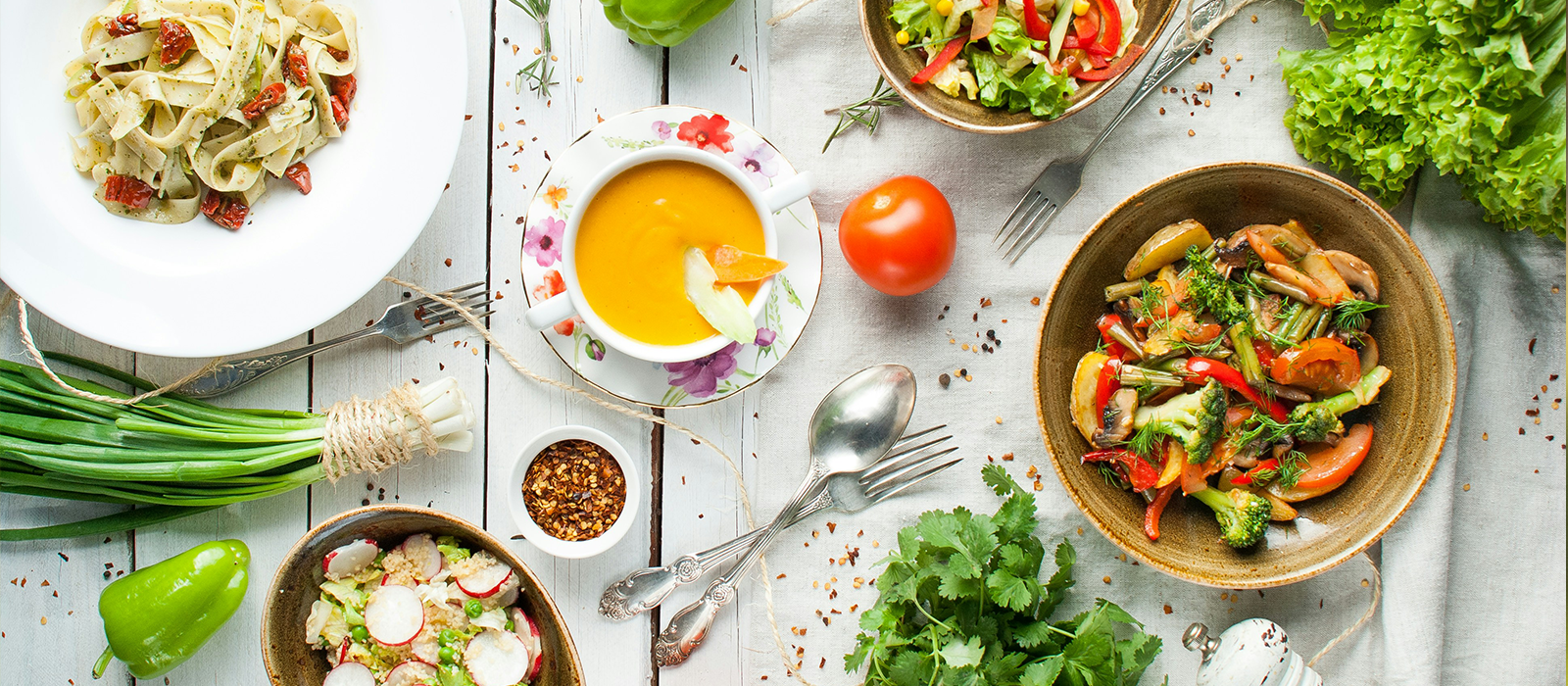It’s easy to feel confused about what’s best for our health with so many conflicting studies and headlines. While most of us want to make choices that are good for us and don’t harm others, the farming industry goes to great lengths to deliberately mislead us. They tell us that animal products are key to a healthy diet, yet major health organisations – like the British Dietetics Association – say that a happy, healthy life is entirely possible without consuming the meat and milk of animals.
Better health is possible, and it’s possible without harming animals or exploiting the natural world.
Vegans eat all foods that do not come from animals, such as meat, fish, eggs and dairy products. They tend to eat a greater variety of foods, for example vegetables, fruit, pulses (beans) and nuts, than meat eaters.
Vegans follow a completely plant-based diet and do not eat anything that comes from an animal, including meat, fish, eggs, dairy products and honey.
Vegans also make sure their household products, toiletries and cosmetics are free from animal products and not tested on animals. And they choose not to wear wool, leather, silk, fur or other clothing made from animal-derived materials.
As well as the obvious good groups like meat and dairy, there are a host of other ingredients that come from animals.
Here’s a list of the most common ones to avoid:
| Ingredient | What is it? | Animal-free alternatives |
|---|---|---|
| Whey | A milk by-product that is often used in processed foods, especially baked goods (biscuits, cakes, etc) and breakfast cereals. | Choose a dairy-free version of the product you want to buy. See our ‘Guide to Going Vegan’ for lots of examples. |
| Gelatine | A jelly-like substance made from boiled animal bones, skin and ligaments. | Agar, carrageenan or pectin |
| Vitamin D3 | A vitamin supplement often found in breakfast cereals that is usually made from fish oil or lanolin (from sheep). | Vitamin D2 is always plant-based, or you can get a vegan vitamin D3. |
| E120 (cochineal or carmine) | Red food colouring made from insects | Avoid products with lots of E numbers, or use non-animal versions, such as E160d |
| E904 (shellac) & E901 (beeswax) | Resins produced by insects that are used to glaze both food and non-food items. | Avoid products with lots of E numbers or choose un-glazed/un-waxed versions. |
| E322 (lecithin) | A fatty substance found in nerve tissue, egg yolk and blood. Used to emulsify fats and oils. | Soya lecithin & sunflower lecithin |
| Lactose | A sugar usually derived from cow’s milk. | Other forms of sugar can be used, depending on the situation, or choose a dairy-free version of the product you want to buy. |
| Casein | A milk protein that is the main component of cheese and is sometimes used as a food additive. | Choose a dairy-free version of the product you want to buy. |
| Suet, dripping & lard | Solid fat from the bodies of cows, pigs or sheep. | Vegetable suet, dairy-free margarine, coconut oil and other vegetable oils |
| Albumin | Proteins found in egg whites and blood, often used as binding agents. | Choose a dairy-free version of the product you want to buy. See our ‘Guide to Going Vegan’ for lots of examples. |
| Worcestershire sauce | A flavouring sometimes used in processed foods that contains anchovies (small fish). | Vegan versions of Worcestershire sauce are produced by Biona, Geo Organics, Tiger Tiger and Granovita. Also try mushroom ketchup. |
| Quorn | A meat-substitute made from mycoprotein, which also often contains egg and milk proteins. | Quorn has a growing range of vegan products with clearly labelled packaging, or you can choose from a number of other vegan meat-substitutes. See our ‘Guide to Going Vegan’ for alternative brands. |
There is no lack of protein in vegan foods.
The best sources are:
- Pulses, for example beans, lentils, chickpeas and peanuts
- Foods made from soya beans, such as tofu, burgers, sausages, mince, milk and yoghurt
- Nuts (especially cashew nuts)
- Seeds, for example pumpkin seeds
- Foods made from vegan Quorn
- Wholegrains, such as bread, pasta, rice, oats.
A well-planned vegan diet can provide all the nutrients people need to stay strong and healthy. In fact, studies have shown that people who eat a mainly wholefood, plant-based diet are healthier than those who eat a lot of animal products.
Good plant sources of iron include:
- Pulses, for example beans, lentils, chickpeas and peanuts
- Foods made from soya beans, such as tofu, burgers, sausages, mince, milk and yoghurt
- Green leafy vegetables (such as broccoli, watercress, kale)
- Nuts (especially cashew nuts)
- Seeds, for example pumpkin seeds
- Foods made from vegan Quorn
- Wholegrains, such as bread, pasta, rice, oats
- Dried fruit (apricots, dates, figs, raisins).
Foods such as yeast extract (e.g. Marmite), nutritional yeast flakes (e.g. Engevita), plant milks and non-dairy margarines are often fortified with B12. It is recommended that vegans take a daily B12 vitamin supplement.
Good plant sources of calcium are:
- Calcium-set tofu*, calcium-fortified plant milks and yoghurts
- Some green leafy vegetables, such as broccoli, cabbage, kale, watercress
- Nuts (especially Brazil nuts and almonds)
- Pulses, for example beans, lentils, chickpeas
- Seeds (especially sesame seeds)
- Dried fruit (especially figs).
Animal-free sources include flaxseed oil, ground linseed, hemp seeds and walnuts (aim for three per day). Using vegetable (rapeseed) oil as your main cooking oil will also help you to get enough omega-3 fat.
The British Dietetic Association says that ‘well-planned vegan diets can support healthy living in people of all ages’. And according to the NHS, a ‘balanced vegan diet is healthy for all age groups, as well as nursing mothers’.
If you have any questions about veganism, or you need support, please get in touch!

Living as a vegan
Veganism isn’t just about what we eat. It’s a movement dedicated to embracing kindness, compassion and respect in all parts of life: what we wear, how we spend our time, and how we interact with the world around us.

